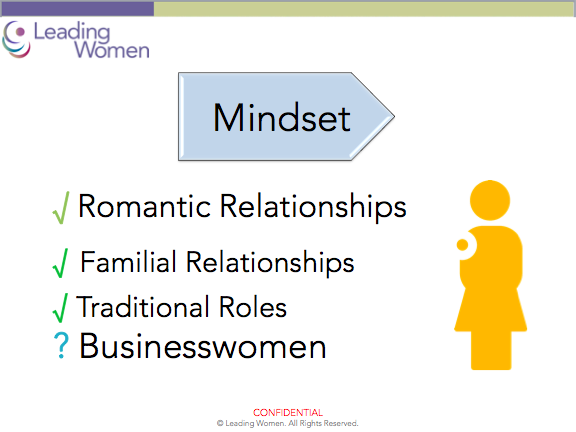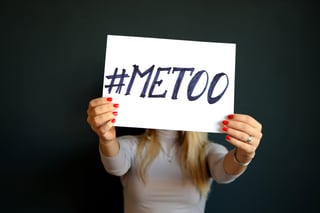
Women haven't wanted to talk about it... men rarely own up to it. The far too silent barrier to women's advancement is the dynamic of Non-Parental Gender-Based Role Expectations. Here's why.
About 10 years ago when we systematically started tracking gender dynamics, we didn't specifically ask about outright harassment because most companies' anti-harassment policies and practices seemed to be working fairly well. Instead we asked about overall "gender-based role expectations (non-parental)" and the dynamics of women being seen and treated as:
- sex objects (through the lens of potential romantic relationships),
- daughters/sisters needing protection or mothers to be rebelled against (through the lens of familial relationships) or
- handmaidens (through the lens of roles traditionally held by women).

But the importance of paying attention to non-parental gender-based role expectations has become more urgent than ever. Sexual harassment has reared its ugly head again, years after we thought we had vanquished it. In fact, Redbook conducted a survey (2017) showing that 80% of women have experienced sexual harassment at work—a mere 10% fewer than in 1976.
Women as sex objects
When it comes to our first category—women being treated like sex objects—the results are often visible, even audible. Women are fielding all kinds of unwelcome behaviors around the globe, from catcalls and jeers on construction sites to harassment in offices and even to sexual assault. Sure, many countries have laws about harassment; in the US, sexual harassment is illegal under federal law. (It violates Title VII of the Civil Rights Act of 1964, which declares that it is illegal to discriminate on the basis of sex, among other things.) But laws are one thing, and reality is another.
 Think sexual harassment is a product of the 50s, when secretaries had to wear tight sweaters and businessmen drank scotch all day? Think again. A recent spate of high-profile sexual harassment and hostile-workplace incidents indicate that even our best-intentioned laws and HR policies are simply not working. Women aren’t just unable to advance because of being treated as sex objects—they are leaving their jobs because of it.
Think sexual harassment is a product of the 50s, when secretaries had to wear tight sweaters and businessmen drank scotch all day? Think again. A recent spate of high-profile sexual harassment and hostile-workplace incidents indicate that even our best-intentioned laws and HR policies are simply not working. Women aren’t just unable to advance because of being treated as sex objects—they are leaving their jobs because of it.
Related US headlines include:
- TIME's Person of the Year 2017: The Silence Breakers
- NBC fired Matt Lauer for sexually inappropriate behavior, and many stories have come to light including Ann Cury left the Today show because of Lauer.
- Mario Batali stepping away from his restaurants after four woman came forward to accuse him of inappropriate touching that showed a pattern of sexual harassment that spanned 20 years.
- US President Donald Trump has been accused of trying to "slut shame" Senator Kirsten Gillibrand (D-NY) who demanded he quit over sexual misconduct claims.
- And the countless number of instances of sexual harassment and assault that have come to light in the wake of the #MeToo movement.
The problem of viewing women as sex objects is not isolated to the United States, 55% of women in the European Union have experienced sexual harassment and 33% have experienced physical or sexual violence since the age of 15, according to a survey by the EU Agency for Fundamental Rights (2014). In addition one out of five woman reported having been stalked at some point. And in October 2017, Members of European Parliament debated sexual harassment and talked about their experience being harassed in the Parliament itself:
Polish ECR member Jadwiga Wiśniewska said: "Here at the very heart of European democracy we have women being molested and harassed. Today’s debate should give strength to women so that they can talk about it.”
“Sadly ... the European Parliament is not immune from this type of deplorable conduct," said Italian EFDD member Daniela Aiuto. “The same zero tolerance ... should not only be applied within the European Parliament, but in all workplaces, both public and private, with the same vigour and on an equal footing.”
“We have reached the end of our patience and the silence has been broken,” said Polish EPP member Agnieszka Kozłowska-Rajewicz. “Victims have started to speak up and their voice has begun to be heard.”
These are examples of why we can't talk only about unconscious bias and why unconscious bias training alone won't close the leadership gender gap. When managers (women and men) look at women through the lens of potential romantic relationship there's nothing unconscious about it. These are conscious decisions to see—and keep—women in certain gender roles. And so we need to talk about these role expectations more loudly than ever. Women should keep speaking out, but it shouldn’t be just a woman’s burden: good men, too, must be silent no more.
Lead ON!
Susan
Susan L. Colantuono, CEO

+1-401-789-0441
Author: No Ceiling, No Walls and Make the Most of Mentoring
"Leadership is using the greatness in you to achieve and sustain extraordinary outcomes by engaging the greatness in others." - Susan L. Colantuono








